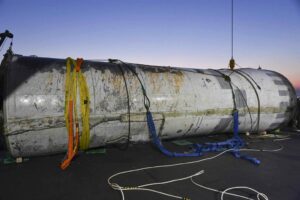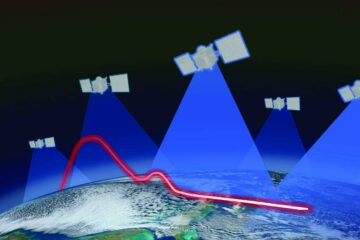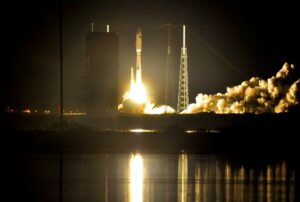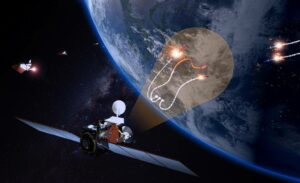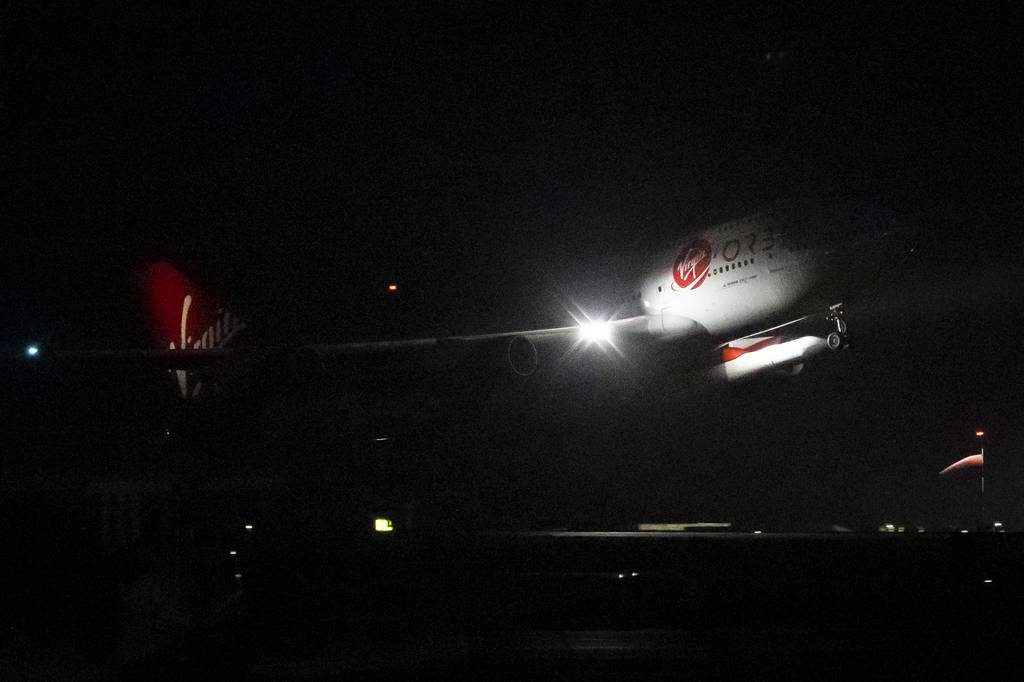
LONDON — A British attempt to become the first Western European nation to put satellites into space from a base on home soil has failed after the Virgin Orbit launch rocket missed the required orbit.
Virgin Orbit officials said Jan. 10 that a still-unexplained anomaly had occurred during the firing of the rocket’s second stage engine, ending the mission.
The air-launched rocket, called LauncherOne, had earlier been dropped from under the wing of a modified Boeing 747 airliner that had taken off from the runway at Spaceport Cornwall in Newquay, south-west England.
The two-stage rocket had nine small satellites onboard, including several military and security payloads. One of the programs involves the U.S. Navy.
Loss of the payloads will be a significant setback for the development of British small, cubesat capabilities – in which it is a world leader.
Among the military payloads was the British government’s Prometheus 2 satellite, led by the Defence Science and Technology Laboratory (Dstl).
Two cereal-box sized Prometheus-2 spacecraft were planned to operate in low Earth orbit, providing a test platform for imaging and monitoring radio signals, including GPS.
The two cubesats had separate equipment installed to test concepts in support of the British MoD’s ISTARI program for future space-based intelligence and surveillance.
The U.S. Naval Research Laboratory also had a stake in the launch effort.
The lab is collaborating with Dstl in the Circe program – a coordinated ionospheric reconstruction cubesat experiment meant to have been placed in orbit onboard LauncherOne.
The collaborative space mission involves investigating the ionosphere, an important area of space impacting GPS, communications, and sensing technology.
A third, defense-related security satellite program onboard the rocket, known as Amber 1 satellite, is designed for maritime intelligence gathering.
The Virgin Orbit launch was meant to be the first of 20 or more such payloads to provide maritime domain awareness.
Five previous missions by California-based Virgin Orbit had taken place from the Mojave Desert in California.
The latest launch from the 747, known as Cosmic Girl, took place over the Atlantic some 50 miles off the coast of Ireland and was on track to become the first such deployment from a Western European nation.
Matt Archer, director of commercial spaceflight at the U.K. Space Agency, said that despite the missions failure it had demonstrated Britain’s ability to launch satellites into orbit.
“While this result is disappointing, launching a spacecraft always carries significant risks. Despite this, the project has succeeded in creating a horizontal launch capability at Spaceport Cornwall, and we remain committed to becoming the leading provider of commercial small satellite launch in Europe by 2030, with vertical launches planned from Scotland,” said Archer.
Andrew Chuter is the United Kingdom correspondent for Defense News.
- SEO Powered Content & PR Distribution. Get Amplified Today.
- Platoblockchain. Web3 Metaverse Intelligence. Knowledge Amplified. Access Here.
- Source: https://www.defensenews.com/global/europe/2023/01/10/first-british-based-space-launch-of-military-satellites-ends-in-failur/
- 1
- 10
- 70
- a
- ability
- After
- agency
- airliner
- always
- amber
- and
- AREA
- awareness
- base
- become
- becoming
- Boeing
- British
- california
- called
- Coast
- collaborating
- collaborative
- commercial
- committed
- Communications
- concepts
- coordinated
- Cornwall
- Creating
- defence
- Defense
- demonstrated
- deployment
- designed
- Despite
- Development
- Director
- domain
- dropped
- during
- Earlier
- earth
- effort
- Engine
- England
- equipment
- Europe
- European
- experiment
- Failed
- fails
- Failure
- firing
- First
- from
- future
- gathering
- Girl
- gps
- Home
- Horizontal
- HTTPS
- images
- Imaging
- important
- in
- Including
- Intelligence
- ireland
- IT
- Jan
- Kingdom
- known
- lab
- laboratory
- latest
- launch
- launches
- launching
- leader
- leading
- Led
- Low
- Maritime
- Military
- Mission
- missions
- modified
- monitoring
- more
- nation
- news
- occurred
- Onboard
- ONE
- operate
- Orbit
- Place
- planned
- platform
- plato
- Plato Data Intelligence
- PlatoData
- previous
- Program
- Programs
- project
- provide
- provider
- providing
- put
- Radio
- remain
- required
- research
- result
- risks
- rocket
- runway
- Said
- satellite
- satellites
- Science
- Science and Technology
- Scotland
- Second
- security
- several
- signals
- significant
- small
- some
- Space
- space-based
- spacecraft
- spaceflight
- Spaceport
- Stage
- stake
- such
- support
- surveillance
- Technology
- test
- The
- the United Kingdom
- Third
- to
- track
- U.K.
- u.s.
- U.S. Navy
- under
- United
- United Kingdom
- Virgin
- Western
- which
- will
- Wing
- world
- zephyrnet

